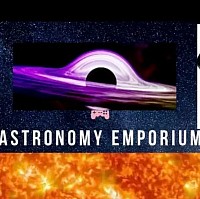"FREE DOWNLOAD: 2025 Stargazing Success Kit"
**🚀 Your 2025 Stargazing Success Kit***A free guide from AstronomyEmporium.com*
Struggling to know what to look for? This kit gives you the top events and targets for the year, all in one place.
**📍 2025's MUST-SEE Astronomy Events**
* **Jan 3-4: Quadrantid Meteor Shower Peak**
* Expect up to 40 meteors per hour. Look Northeast after midnight.
* **Aug 12-13: Perseid Meteor Shower Peak**
* The year's best shower! Up to 60 meteors/hour. Moon will be a thin crescent = perfect dark skies.
* **Mar 14: Crescent Moon & Jupiter Conjunction**
* A beautiful pairing in the evening western sky. Great for binoculars.
* **Oct 8: Annular Solar Eclipse (Partial in UK)**
* **WARNING: Never look at the sun without proper ISO-certified filters.**
* **Dec 13-14: Geminid Meteor Shower Peak**
* Another fantastic shower with up to 50 colorful meteors per hour.
**🔭 Your First 3 Targets (No Telescope Needed!)**
1. **The Moon:** Its craters and "seas" are visible to the naked eye. Binoculars will reveal incredible detail.
2. **Orion's Belt:** Find the three stars in a row. Below them is the Orion Nebula, a fuzzy patch of light where new stars are born.
3. **The International Space Station (ISS):** It looks like a incredibly bright, fast-moving star. Get alerts for when it flies over your house at: [spotthestation.nasa.gov](https://spotthestation.nasa.gov)
**🌌 Pro Tip: Beat Light Pollution**
Find the darkest spot near you. Even driving 15 minutes out of town can make a HUGE difference. Use this free map: [LightPollutionMap.info](https://www.lightpollutionmap.info)
**Clear skies!**
- The Astronomy Emporium Team
Frequently asked astronomy Questions
❓ Where should I start with stargazing as a beginner?🌌 Begin with simple steps like learning to identify a few easy constellations, tracking the Moon, and observing planets with your eyes or binoculars.
👉 Beginner’s Stargazing Guide
❓ How do I read and navigate the night sky?🌠 Using star charts, apps, and basic guides, you can quickly locate constellations, planets, and bright stars.
Full report👉 How to Read the Sky
❓ How do I set up a telescope without getting frustrated?🧭 Choosing an easy-to-use mount and following a step-by-step setup guide ensures you’ll spend more time observing and less time adjusting equipment.
Visit the “How to setup your telescope page”👉 Telescope Setup Made Easy
❓ What equipment should I start with for stargazing?🔭 Essentials include binoculars or a beginner telescope, a red torch, star charts, and a notebook. This kit keeps you prepared without overspending.
More intel👉 Essential Stargazing Kit for Beginners
❓ Which telescopes are best for beginners?✅ Find affordable and reliable options that balance ease of use with performance. Avoid gimmicky high-magnification models.👉 Beginner’s Buying Guide
❓Where can I shop safely for telescopes?🛒 Use reputable online or local astronomy stores to ensure good advice, warranty, and support for your first telescope.
👉 Visit The Telescope Listings
❓ Which telescope brands and models are actually worth it?🔬 Honest reviews help beginners avoid disappointment and choose the right gear for their needs.👉 See Honest Telescope Reviews Here
❓ What telescopes are best under £250?💷 Affordable yet capable telescopes allow you to see planets, the Moon, and brighter deep-sky objects without breaking the bank.
👉 Looking for the Best Telescopes Under £250?
❓ What telescopes are best between £250 and £350?✨ Stepping up your budget opens more advanced telescopes with better optics and mounts, ideal for serious beginners.
👉 Find your Best Telescope £250–£350
❓ Which telescopes are best between £400 and £550?🪐 At this range, beginners can get high-quality optics that let you explore planets, star clusters, and brighter nebulae.
If You’re serious about getting the best Astronomy experience why not jump in and get yourself a serious telescope and start your stargazing journey here:
👉 Best Telescopes £400–£550
❓ What are the best binoculars for stargazing?🔭 Binoculars like 10x50s are versatile, portable, and great for scanning star fields, spotting the Moon, and observing
❓ Which stargazing accessories are must-haves?
🧰 Tools like red torches, star charts, smartphone apps, and lens cleaning kits make your stargazing more productive and enjoyable.
👉 Must-Have Stargazing Accessories
❓ Which astronomy books should I read to learn faster?📚 Beginner-friendly guides and star charts help you identify constellations, learn the night sky, and understand celestial phenomena.
👉 Best Astronomy Books
❓ How can I find deep sky objects like galaxies and nebulae?🌌 Using star maps, apps, and simple guides, even beginners can locate clusters, nebulae, and galaxies in dark skies or from their gardens.
Go on! Broaden your Horizon’s
👉 How to Find Deep Sky Objects
❓ What’s interesting in the sky this month?🌠 Monthly highlights like meteor showers, visible planets, or special alignments keep your stargazing exciting and give you short-term targets.
See the full report
👉 What’s in the Sky This Month?
💡 Want to go deeper? Explore the full Beginner’s Stargazing Guide and dive into all our expert tips, reviews, and stargazing resources!

